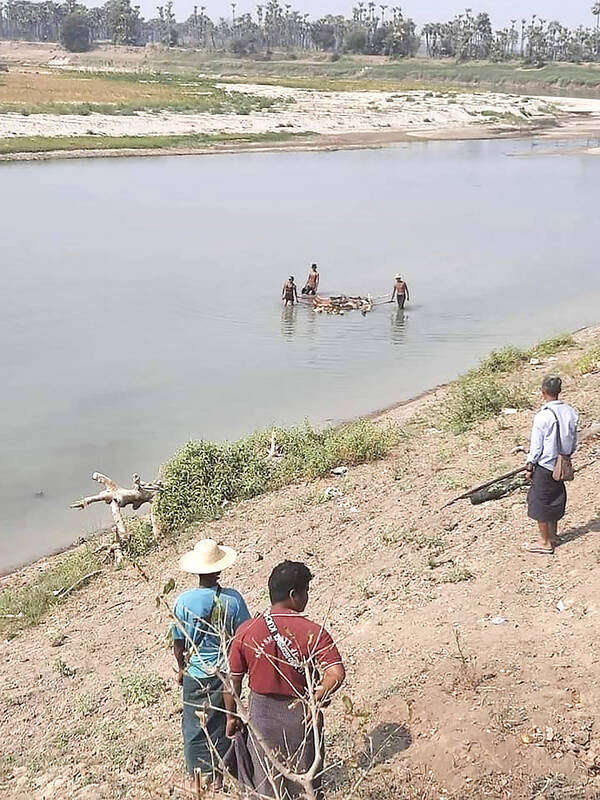A human rights researchers group officially launched a Web site on Wednesday that they hope would help see justice for victims of state violence in Myanmar, where one of the world’s less-noticed but still brutal armed struggles is occurring.
Since the army’s coup against the elected government of Aung San Suu Kyi in February 2021, thousands of people have been killed by security forces seeking to quash pro-democracy resistance. According to the UN, more than 1.8 million people have been displaced by military offensives, which critics said have involved gross human rights violations.
War crimes have become easier to document thanks to the ubiquity of cellphone cameras and near-universal access to social media, where photos and videos can easily be posted and viewed.

Photo: AP
Yet it is harder to establish who is responsible, especially generals and other high-ranking officers behind the scenes who plan and give orders.
“Generals and lower ranking officers should fear being dragged before a court of law and imprisoned for crimes they ordered or authorized,” Tom Andrews, the UN special rapporteur on the situation of human rights in Myanmar, said by e-mail. “Research must move beyond merely stating the obvious — that crimes are occurring — and connect those who are responsible to specific atrocities. The victims of these crimes deserve justice and that will require the research necessary to hold those responsible fully accountable.”
The new Web site, myanmar.securityforcemonitor.org, is an interactive online version of a report, Under Whose Command? — Human rights abuses under Myanmar’s military rule, compiled by Security Force Monitor, a Columbia Law School Human Rights Institute project, to connect alleged crimes with their perpetrators.
The project team constructed a time line of senior commanders and their postings, which could be correlated with documented instances of alleged atrocities that occurred under their commands. It exposes the army’s chain of command, identifying senior army commanders and showing the connections from alleged rights violations to these commanders, study director Tony Wilson said.
“This is one of the pieces of the jigsaw that has up until now been missing in terms of accountability — demonstrating how the system works and that these abuses are not just the result of rogue units or individual soldiers,” Wilson said.
He said the Myanmar data show that 65 percent, or 51 of all 79 senior army commanders from the end of March 2011 to the end of March this year, “had alleged disappearances, killings, rape or instances of torture committed by units under their command.”
He said the study also shows the officer with the most links to serious human rights violations is General Mya Htun Oo, who became the country’s minister of defense and a member of the ruling military council when the army seized power in 2021. He also became deputy prime minister this year.
The legal significance leans on the established doctrine of “command responsibility,” which allows the prosecution under international law of military commanders for war crimes perpetrated by their subordinates.

The Burmese junta has said that detained former leader Aung San Suu Kyi is “in good health,” a day after her son said he has received little information about the 80-year-old’s condition and fears she could die without him knowing. In an interview in Tokyo earlier this week, Kim Aris said he had not heard from his mother in years and believes she is being held incommunicado in the capital, Naypyidaw. Aung San Suu Kyi, a Nobel Peace Prize laureate, was detained after a 2021 military coup that ousted her elected civilian government and sparked a civil war. She is serving a

‘NO AMNESTY’: Tens of thousands of people joined the rally against a bill that would slash the former president’s prison term; President Lula has said he would veto the bill Tens of thousands of Brazilians on Sunday demonstrated against a bill that advanced in Congress this week that would reduce the time former president Jair Bolsonaro spends behind bars following his sentence of more than 27 years for attempting a coup. Protests took place in the capital, Brasilia, and in other major cities across the nation, including Sao Paulo, Florianopolis, Salvador and Recife. On Copacabana’s boardwalk in Rio de Janeiro, crowds composed of left-wing voters chanted “No amnesty” and “Out with Hugo Motta,” a reference to the speaker of the lower house, which approved the bill on Wednesday last week. It is

‘EAST SHIELD’: State-run Belma said it would produce up to 6 million mines to lay along Poland’s 800km eastern border, and sell excess to nations bordering Russia and Belarus Poland has decided to start producing anti-personnel mines for the first time since the Cold War, and plans to deploy them along its eastern border and might export them to Ukraine, the deputy defense minister said. Joining a broader regional shift that has seen almost all European countries bordering Russia, with the exception of Norway, announce plans to quit the global treaty banning such weapons, Poland wants to use anti-personnel mines to beef up its borders with Belarus and Russia. “We are interested in large quantities as soon as possible,” Deputy Minister of National Defense Pawel Zalewski said. The mines would be part

Cozy knits, sparkly bobbles and Santa hats were all the canine rage on Sunday, as hundreds of sausage dogs and their owners converged on central London for an annual parade and get-together. The dachshunds’ gathering in London’s Hyde Park came after a previous “Sausage Walk” planned for Halloween had to be postponed, because it had become so popular organizers needed to apply for an events licence. “It was going to be too much fun so they canceled it,” laughed Nicky Bailey, the owner of three sausage dogs: Una and her two 19-week-old puppies Ember and Finnegan, wearing matching red coats and silver